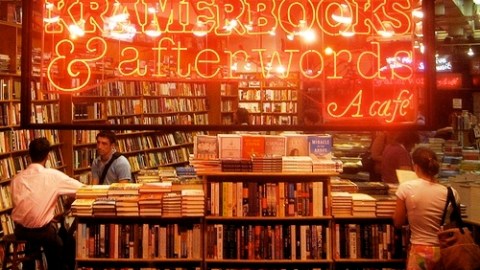With Death of Borders, What Is The Future of Independent Book Sellers?

Monday I posted on the reasons for the fall of Borders, reasons that go much deeper and broader than simply blaming Amazon. But how are the most treasured of urban spaces — independent bookstores– managing? Are they under the same pressures as Broders and what strategies are they pursuing to stay ahead?
Independent book sellers in major cities appearing to be surviving, if not in some cases thriving. As Borders has faltered, independent bookstores, as I wrote last year, have pursued a range of strategies including the use of social media to strengthen relationships with customers, expanded book events, and new in store cafes and live music. But the desire among consumers to regain a sense of the local–experiencing an indie bookstore as a nexus point for their community and as a social outlet—might be the biggest factor. Yet as NY Mag details, the profit margin for an indie remains very tight. Most successful owners are in the business out of passion and a sense of mission, rather than a desire to make it rich.
Last week, the PBS Newshour Art Beat blog did a round up of perspectives from owners/managers of some of the country’s leading — and most treasured — independent bookstores. You can read the full post here but below are a few excerpts from some of my top picks among indies.
Politics and Prose Bookstore, Washington, D.C.Lissa Muscatine and Bradley Graham, owners
Politics and Prose continues to thrive as an independent bookstore because we are so deeply rooted in our community — a community that appreciates the difference between an independent, socially-conscious, neighborhood institution and a national brand. Our customers want and demand civic engagement and set a high intellectual bar. We offer them an experience they simply cannot get on-line or at big box stores and chains. Our booksellers are expert curators who understand the tastes and interests of our customers. We host 500 events in the store each year with leading (and emerging) authors. We offer courses and classes, organize and lead book clubs, and are a gathering place for readers, writers, thinkers, and citizens who want to be involved in serious discourse about the ideas and issues of the day. Moreover, we partner with local schools, universities, cultural institutions and other organizations in ways that build and strengthen our community. We contribute to our community by paying local taxes, unlike some of the on-line retailing giants. In short, we are genuinely part of our community, and that is a key to our success.
The Strand Book Store, New YorkNancy Bass Wyden, co-owner
The Strand Book Store has been around for 84 years, surviving Book Row, the Great Depression, big box stores and online retailers, because Strand founder Benjamin Bass, his son Fred and granddaughter Nancy Bass Wyden have been willing to change with the times and keep pace with their customers’ needs.
As a family-owned business, the Strand has the ability to adapt to changing circumstances quickly. When our customers began requesting new books, we started buying books directly from the publishers; when we witnessed a steady increase in our online sales, we redesigned the site to make shopping at strandbooks.com even easier; when customers asked for gift wrap and greeting cards, we added a stationery department….
[W]e host weekly events with authors and artists; we have fun writing and art contests; we sell gift items for book-lovers and nostalgic candy and, to carry it all home, we offer a wide selection of fun and unique tote bags. With 18 miles of new, used and rare books, and the largest art book department in the world, the Strand has something for everyone and for every budget — books range in price from $.48 to $45,000.
Porter Square Books (left), Cambridge, Mass.Ellen Jarrett, events manager
It is ALWAYS sad to see a bookstore close. It has an effect on the book business from top to bottom – publishers to independent retailers. One fear is that people served by Borders live in places that aren’t/can’t be served by an independent bookstore. They will be forced to go online to a place like Amazon. Not good for us. However, there is now an impetus to open more independents in these areas. We don’t believe that people are necessarily buying fewer books, at least that is not our experience. We are doing well and can now sell ebooks online to our customers through Google e-books. We are a destination and a community gathering place and consider that to be one of the most important functions we serve. It is so important to nurture the human touch!
City Lights Books, San FranciscoElaine Katzenberger, Executive Director and Publisher
Now more than ever, we believe that what we do is crucial. We believe that intelligent discourse and unfettered questioning are the foundations for any hope for an engaged citizenry, crucial for democracy and for the health of us all. We’ve been an independent bookseller and publisher for over 55 years, and the vision that still inspires us was born in a time similar to our own — a prevailing culture of paranoia and fear — and City Lights was founded as an attempt to further a robust, informed confrontation with the realities of the time. Providing a place for people to engage with ideas — and with each other — is what bookstores, and books themselves, do. We’re committed to that mission, and to those who share it.
Like all small businesses, our capacity to continue playing a meaningful role is being challenged in many ways: most obviously by the global downturn in the economy, and by the effects that developing technologies are having on every aspect of our lives, but most powerful is the challenge of a media culture that seems intent on devaluing intelligent discourse in order to increase profits. Our hope lies in the strength of enough people’s ability to resist that numbing force, and as long as those people remain committed to a future that’s not dictated purely by profit margins, City Lights will survive, and continue to do our part.





